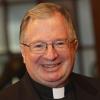As yet another week of apocalyptic violence swept across Gaza, Fouad Twal, the Latin Patriarch of Jerusalem, has been making the rounds in Washington, advancing the cause of Palestinian Christians and of peace in the Holy Land. His itinerary has included the U.S. Commission on International Religious Freedom, the White House National Security Council, the U.S. bishops' conference, Catholic News Service, and supporters in the Holy Land Christian Ecumenical Foundation (HCEF). In a moving plea to diners at an HCEF-sponsored dinner Wednesday, the patriarch made an eloquent plea: "Do not leave me alone. Do not leave us alone."
Twal pleaded for the church across the region. The church of Jerusalem, he explained, understands it has a vocation to suffering. It is "a church of Calvary," he said. "The church of Iraq," he added, where Christians have been expelled by the jihadist ISIS, is "a church of Calvary. The church of Syria is a church of Calvary," too, where civil war has destroyed one of the last remaining refuges for Christians in the region and driven tens of thousands into encampments in Jordan.
The church in the Holy Land suffers its own Calvary. In Gaza, though the parish priest remains, the patriarch reported to another group, the three religious communities staffing schools have fled the fighting in the Palestinian enclave. "The whole church of the Middle East is a church of Calvary. Do not leave us alone," Twal concluded.
Pressed on what contribution the church can make to peace in the region, the patriarch explained its primary efforts come through education, where Christians, Muslims and sometimes Jews mix with one another in the classroom. The Latin Patriarchate runs 118 elementary and high schools in Israel, Palestine and Jordan. This co-religious education makes for lifetime friendships, knowledge of Christianity, and a set of values that bring respect for Christians despite their minority religious status.
Twal also made the case for his special initiative, the American University of Madaba in Jordan. AUM, he argued, will be a force for moderation, bringing Muslims and Christians together, not just from Jordan but from across the region, at a time when the havens of moderation are harder and harder to find.
In meetings with concerned Catholics and public officials, the patriarch pursued an updated agenda of religious liberty issues. The newest of these is the efforts of the Israeli government to create a special identity for Arab Christians in the Jewish state. According to legislation making its way through the Knesset, the Israeli parliament, Arab Christians in Israel will be required to carry an ID card marking them as Christians. Young Christians will also be eligible to be drafted into the Israeli Defense Forces.
The Christians regard the ID as discriminatory because, contrary to Israel's own democratic aspirations, it makes their religion something that singles them out in Israeli society. Politically, it also has the insidious effect of dividing them from the Muslim Arab citizens of Israel. For propaganda purposes, it then becomes easier for the narrative of the Israeli-Palestinian conflict to be presented as a strictly Jewish-Muslim one. By contrast, for decades, the Christian leaders in the Middle East, like the Council of Catholic Patriarchs and the former Latin Patriarch Michel Sabbah, have endeavored to articulate their bridging role as Arab Christians whose unique self-definition has been colored by 1,400 years of coexistence with Muslims.
Another long-term issue affecting young people concerns family formation, especially in Jerusalem. For many years, Israel has refused to approve residency permits for Jerusalemites who marry spouses from the West Bank. To form a family in such a relationship, a couple must move to the West Bank. In addition, residency permits for Arabs living in Jerusalem may be pulled for any number of reasons, including study or work abroad.
Finally, there is the lack of access to the holy places affecting all Arab Christians and Muslims, which has a notably deleterious effect on young Palestinian Christians, who are unable to visit the holy places so central to the religious life of Holy Land Christians. This is a long-lingering problem, but the separation wall between Israel and Palestinian territories has made it increasingly difficult for Palestinian Christians from Bethlehem and the nearby Christian towns to visit. Indeed, Bethlehemites are now constrained by a maze of walls, which put a stranglehold not only on religious observance, but on everyday life.
[Jesuit Fr. Drew Christiansen is former editor of America magazine and a professor of ethics at Georgetown University. Ra'fat Aldajani is a Palestinian-American writer and commentator.]





